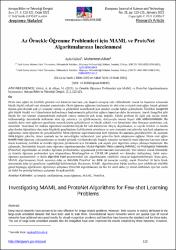| dc.contributor.author | Gülcü, Ayla | |
| dc.contributor.author | Alkan, Muhammet | |
| dc.date.accessioned | 2023-07-27T07:13:43Z | |
| dc.date.available | 2023-07-27T07:13:43Z | |
| dc.date.issued | 2021 | en_US |
| dc.identifier.citation | GÜLCÜ, Ayla & Muhammet ALKAN."Az Örnekle Öğrenme Problemleri için MAML ve ProtoNet Algoritmalarının İncelenmesi." Avrupa Bilim ve Teknoloji Dergisi, 21 (2021): 113-121. | en_US |
| dc.identifier.uri | https://dergipark.org.tr/tr/pub/ejosat/issue/59648/834647 | |
| dc.identifier.uri | https://hdl.handle.net/11352/4608 | |
| dc.description.abstract | Derin sinir ağları ile özellikle görüntü veri kümeleri üzerinde çok başarılı sonuçlar elde edilmektedir. Ancak bu başarının arkasında
büyük ölçekli etiketli veri kümeleri yatmaktadır. Derin öğrenme ağlarının özelleşmiş bir türü olan evrişimli sinir ağları birçok görüntü
tanıma görevlerinde çok iyi sonuçlar vermiş ve görüntüleri modellemek için standart araçlar haline gelmişlerdir. Özellikle ImageNet
gibi büyük ölçekli veri kümelerinin kullanılmaya başlanmasıyla geliştirilen ağların başarıları daha da artmıştır. Ancak ImageNet gibi
büyük bir veri kümesi oluşturabilmek maliyetli olması nedeniyle pek kolay değildir. Eldeki problem ile ilgili çok sayıda örnek
toplanamadığı durumlarda kullanılan sinir ağı yeterince iyi eğitilememekte, dolayısıyla istenen başarı elde edilememektedir. Bu
nedenle derin sinir ağlarının genelleme yeteneklerinin geliştirilmesi ve büyük etiketli veri kümelerine olan ihtiyacın azaltılması çok
önemlidir. Tasarlanan bir makina öğrenmesi modelinin büyük bir veri kümelerine ihtiyaç duyulmadan, az sayıda örnekle ve önceki
görevlerden öğrenilmiş olan meta-bilgilerle genelleştirme kabiliyetinin artırılması ve aynı zamanda yeni görevler için hızlı adaptasyon
sağlanması meta-öğrenme ile gerçekleşebilir. Meta-öğrenme algoritmalarında hızlı öğrenme iki aşamada gerçekleştirilir; ilk aşamada
meta-bilgiler çıkarılır, ikinci aşamada ise bu meta-bilgiler kullanılarak yeni görevlere hızlı adaptasyon sağlanır. Derin sinir ağları
temelli meta-öğrenme yaklaşımlarının az örnekli görüntü veri kümelerinde başarılı sonuçlar vermesiyle meta-öğrenme kavramı tekrar
önem kazanmış; özellikle az örnekle öğrenme problemleri için literatürde çok sayıda yeni algoritma ortaya çıkmaya başlamıştır. Bu
çalışmada, literatürdeki başarılı meta-öğrenme algoritmalarından Model-Agnostic Meta-Learning (MAML) ve Prototypical Networks
(ProtoNet) algoritmaları az örnekle öğrenme problemlerine uygulanarak performansları incelenmiştir. Veri kümesi olarak literatürde
az örnekle öğrenme problemleri için oluşturulmuş MiniImageNet ve CIFAR100 görüntü veri kümeleri kullanılmış; farklı metaöğrenme parametreleri ve farklı algoritma hiper-parametreleri için algoritmaların verdikleri sonuçlar değerlendirilmiştir. Buna göre,
MAML algoritmasının örnek sayısının daha az durumda ProtoNet’ ten daha iyi sonuçlar verdiği; ancak ProtoNet’ in fazla örnek
durumunda daha iyi genelleme yapabildiği belirlenmiştir. Bu durum, MAML algoritmasının bütün sınıfları ayırt edebilecek nitelikte
genel başlangıç ağırlıklarını öğrenmeye çalışması; ProtoNet algoritmasının ise her bir sınıfı daha iyi temsil edebilmek için her sınıfa
ait farklı bir prototip bulmaya çalışması ile açıklanabilir. | en_US |
| dc.description.abstract | Deep neural networks have proven to be very effective for image-related problems. However, their success is mainly attributed to the
large-scale annotated datasets that have been used to train them. Convolutional neural networks which are special type of neural
networks have achieved very good results for visual recognition problems and therefore have become the standard tool for these tasks.
The use of large-scale annotated datasets like the ImageNet have even improved the results obtained by these networks. However,creating an annotated dataset of that scale is very difficult due to its cost. In some cases, even if there are enough resources, it is
sometimes impossible to obtain such large datasets. It is shown that the neural networks cannot be trained well if there is not enough
training data. As these networks require large amounts of annotated data to be able to generalize well, it is very important to develop
new models that can be trained well even if the training data is not abundant. Meta-learning paradigm addresses this problem of fewshot learning by proposing models that can utilize the experience from the previous tasks to learn new tasks. Meta-learning algorithms
gain the fast adaptation ability by using the meta-data obtained from the previous tasks. The meta-learning concept has regained its
popularity after the success of some deep neural networks-based meta-learning algorithms for the few-shot image classification
problems. In this study, two meta-learning algorithms, namely, Model-Agnostic Meta-Learning (MAML) and Prototypical Networks
(ProtoNet) are applied to few-shot learning problems and their performance is evaluated. MiniImageNet and CIFAR100 few-shot
learning image classification datasets have been used as the test bed, and the two algorithms have been evaluated under different
meta-learning and algorithm hyper-parameter settings. The results suggest that MAML results in better classification accuracy than
ProtoNet when the number of shot is taken as 1, and ProtoNet results in better accuracy when the number of shot is increased. The
main reason for this is that while MAML tries to find common initial weights that can easily distinguish all classes, ProtoNet tries to
find a different prototype for each class, and the number of shots definitely increases the representation power of that prototype. | en_US |
| dc.language.iso | tur | en_US |
| dc.publisher | Osman Sağdıç | en_US |
| dc.relation.isversionof | 10.31590/ejosat.834647 | en_US |
| dc.rights | info:eu-repo/semantics/openAccess | en_US |
| dc.subject | Az Örnekle Sınıflandırma | en_US |
| dc.subject | Meta-öğrenme | en_US |
| dc.subject | MAML | en_US |
| dc.subject | ProtoNET | en_US |
| dc.subject | Meta-learning | en_US |
| dc.subject | Few-shot Classification | en_US |
| dc.title | Az Örnekle Öğrenme Problemleri için MAML ve ProtoNet Algoritmalarının İncelenmesi | en_US |
| dc.title.alternative | Investigating MAML and ProtoNet Algorithms for Few-shot Learning Problems | en_US |
| dc.type | article | en_US |
| dc.relation.journal | Avrupa Bilim ve Teknoloji Dergisi | en_US |
| dc.contributor.department | FSM Vakıf Üniversitesi, Mühendislik Fakültesi, Bilgisayar Mühendisliği Bölümü | en_US |
| dc.contributor.authorID | https://orcid.org/0000-0003-3258-8681 | en_US |
| dc.contributor.authorID | https://orcid.org/0000-0001-5188-2742 | en_US |
| dc.identifier.issue | 21 | en_US |
| dc.identifier.startpage | 113 | en_US |
| dc.identifier.endpage | 121 | en_US |
| dc.relation.publicationcategory | Makale - Uluslararası Hakemli Dergi - Kurum Öğretim Elemanı | en_US |
| dc.contributor.institutionauthor | Gülcü, Ayla | |
| dc.contributor.institutionauthor | Alkan, Muhammet | |



















